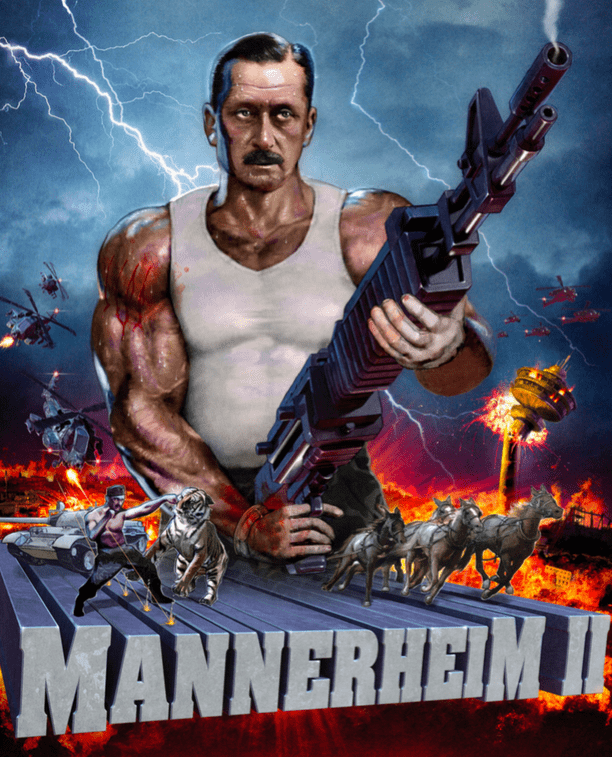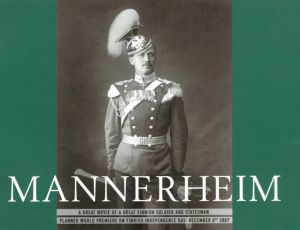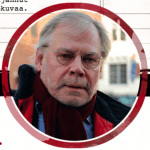Why don’t you boys make the movie, we’ll handle the financing! – A short story of a film that was never made
Jukka Helle, the CEO of Solar Films since 1998
The thought about the biopic of the life of Marshal of Finland had been brewing in the minds of professor Heikki A. Reenpää and lieutenant general Ermei Kanninen for a long time. To make their dream come true, the gentlemen established a society called Champion of Liberty and ordered a screenplay from Heikki Vihinen, a theater manager at the time. The writing was financed by Nokia, Nordea (Merita), UPM-Kymmene and Otava. The screenplay was extensive and thorough and demanded a vast amount of background reseach. It was a wonderful stepping stone for the film script – during the next decade, several dozens were made.
The troops, led by professor Reenpää, wanted to assure of the quality of the Mannerheim movie they were planning. They asked Matti Kassila, a legendary director, to give his opinion who could carry out a project of this magnitude. The name Renny Harlin came up and with his co-operation, the project was presented to Markus. With relatively bold statements, the generals assured that they would handle the financing and the moviemakers could concentrate on their core business, making the actual film.
Approximately 14 years of active work, over three million of Markus’s personal funds, 1,5 million of Solar Films money, some amount of my personal assets and a shocking amount of labour and time were spent before the project was cancelled, when Finnvera filed bankruptcy for Liberty Production – the company that had been established to produce the movie.
The Champion of Liberty society had representatives of wealthy industry families (e.g. Reenpää, Sohlberg) and the world of finance (von Knorring). But it is remarkable that with all their connections and support groups, the society didn’t manage to raise one euro for the production. Besides Markus, the only private person who had to spend his own money, was professor Reenpää. He had ordered Mannerheim medals from the Mint of Finland, without authorization, in the name of Liberty Productions – and in the end he had to pay the bills himself, showing remarkable integrity.
Those 14 years I was involved in the project, saw a lot of incidents. Several meetings in the cabinets of Otava, eating Danish pastries, as Champion of Liberty hosted different groups and delegations. Various financial meeting organized by the very same society, to meet e.g. Jorma Ollila, Björn Wahlroos and other remarkable figures of the business world. The result was always the same; the generals’ illusion of “patriotic money” didn’t exist in the modern world. Kanninen and Reenpää were able to open a lot of doors – but all the decisions were made with Excel tables, from the point of view of quarterly economy. The secretary of mr. Wahlroos bought one Mannerheim statuette (which had been made to finance the movie) for ten thousand euros. That was the only concrete result of these meetings.

But the production company was able to raise the financing for the film, including a foreign sales contract that was unusually large for a Finnish movie – two times. But both times the project hit the rocks with a loud crash. First time the principal photography was scheduled to commence in the spring of 2009 – but just before the cameras were supposed to be rolling, a major foreign financier backed out, pleading to the big risks involved. The production company had a lot of commitments, the cashflow was interrupted and the company went into a crisis. Too much had been done, too many commitments had been made – so the project couldn’t be interrupted or buried. So we directed all the energy to acquire the new financing.
A breakthrough happened in the spring of 2010, when a German production company committed to acquire the missing part of the funding. This commitment and a few other new financial sources made a new, realistic production plan possible and lead to a pre-production period in Hungary. There was new excitement in the air; new locations were found, new production plans were made, new wardrobe, new set design, new props – all this took place.
The pre-production in Hungary was meticulous and everything was ready – until we found out that the cash flow calculation had changed and was now unrealistic – this was the part when we started to have doubts about our German co-producer. The German funding was mostly based on the Hungarian tax rebate system for audiovidual productions – and to make use of that, the incoming cash flow needed to be more upfront than normally in movie productions. Our payment schedule had been locked with the financiers and because our cash flow dried out, the Hungarian production service company pulled the plug in August 2010. A new crisis was born.
This interruption set a chain of events in motion; we tried to discount our financial agreements, with no results. The search for new financial sources was continuous, in vain – and finally we had to bring the Finnish crew back home. Then, out of the blue, the Russians reached out: a new player was brought to the table, found by a Finnish consultant. International Foundation for Innovation and Investment was willing to negotiate to pre-buy the distribution rights of Russia and the CIS countries. Behind the foundation was the ex-president, one mr. Gorbachev. Things were happening fast and in the middle of a snowstorm and coldness of December, two Russian gentlemen flew in from Switzerland, to sign a deal worth of 4 million euros. A few hours of negotiations and the final contract was made: the men boarded a train to Moscow, to go back home. I went to Moscow in January to negotiate the payment schedule; all details we carefully added to the contract. We had the financing for the movie in place, once again.
The first payment was supposed to happen June 1st, 2011. The funds never arrived and all the imaginable collection attempts turned out to be fruitless.
Renny was discouraged and – after collecting his full fee – informed us that he wasn’t any longer committed to the project. He was replaced by Dome Karukoski; a director who earned the trust of our main financiers immediately. On the other hand, more hiccups happened with the German co-financier. Finnvera had guaranteed the self financing part of our financing plan, but started to collect its provisions and interests in an impatient fashion. All of a sudden, things were very tight again.
It didn’t make our lives any easier that the wardrobe, partly tailor-made, partly bought and rented, was in a warehouse in Hungary and due to the unpaid rents, the whole wardrobe was in jeopardy of being foreclosed. That would’ve caused massive damages to a lot of Finnish theaters and the broadcasting company YLE. Our only choice was to find 40 000 euros, to pay the overdue rents, and ship the wardrobe to Finland. No one wanted to buy it – so Markus and I bought the whole lot and are paying considerable storage fees still as I write this.

As the domestic financing possiblities were checked out – many times – we once again turned our eyes towards Russia. We made a co-financing deal with a remarkable production company, which was in close contact with the government of the state. A meeting with the Russian Minister of Culture was set up on a short notice in the spring of 2012. The Minister knew about the project and the financing wasn’t going to be a problem, once the script was adapted to the liking of the Russian audiences – and financial sources. The writing process turned out to be too slow, and the financing came to a halt as Finnvera ran out of patience and filed bankruptcy for the production company.
This procedure caused a lot ot problems. The personal collaterals of Markus were realized, several subcontractors were not reimbursed, the enormous amount of years and years of work started pouring down the drain, big time. The wardrobe situation became once again a headache, as if there weren’t enough problems without that. According to the liquidator, the items could not be sold problem-free; the speculative price of the wardrobe was potentionally higher than the transfer price. That option would’ve left the wardrobe in Hungary, causing a lot of damage to YLE, The National Theatre and several other sources. Finally, the wardrobe was salvaged and returned to the owners.
It is crystal clear that we will not continue with the project. It has cost us so much time and money. A great dream, big promises, a lot of mistakes, an enormous disappointment. Several people were committed to the project for years, doing their job with enthusiasm and passion, never losing their faith, despite all the hardships. Mika Karttunen wrote dozens of different versions of the screenplay, with several co-writers, in a gratuitous manner and was the trusted support of both directors and Mikko Nousiainen, who was cast for the title role. Nousiainen also dedicated years of preparation to the project; studying Russian, riding horses, learning the officer’s etiquette and several other special skills the role required. The whole staff of Solar Films had to take part in the production in many ways – and finding the motivation was never a problem. A big thank you to all of you!
I still think Mannerheim would’ve deserved this movie.





